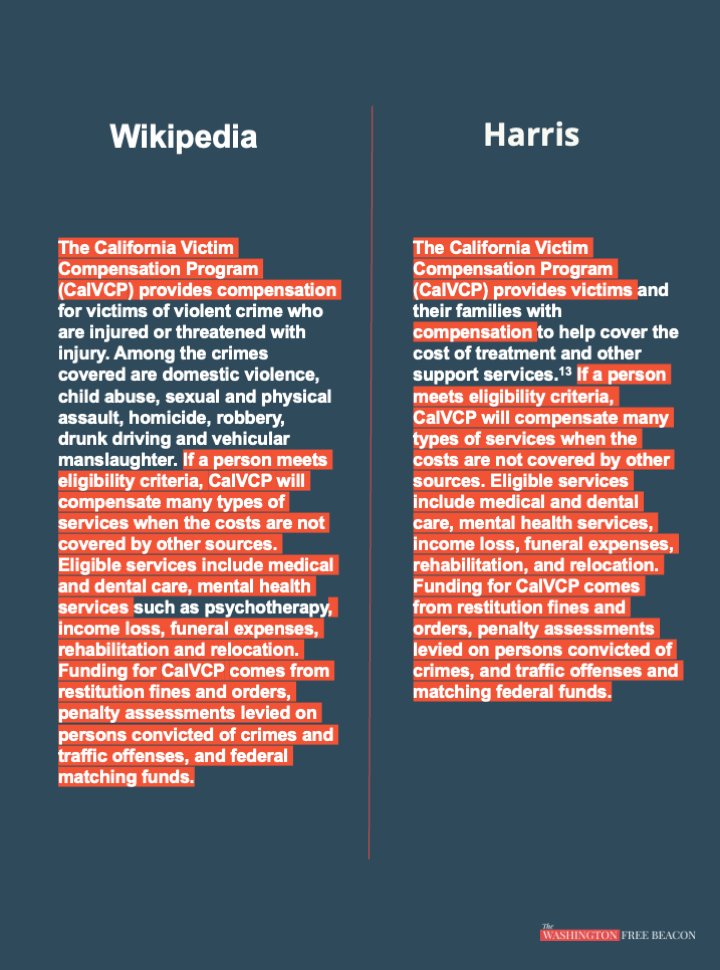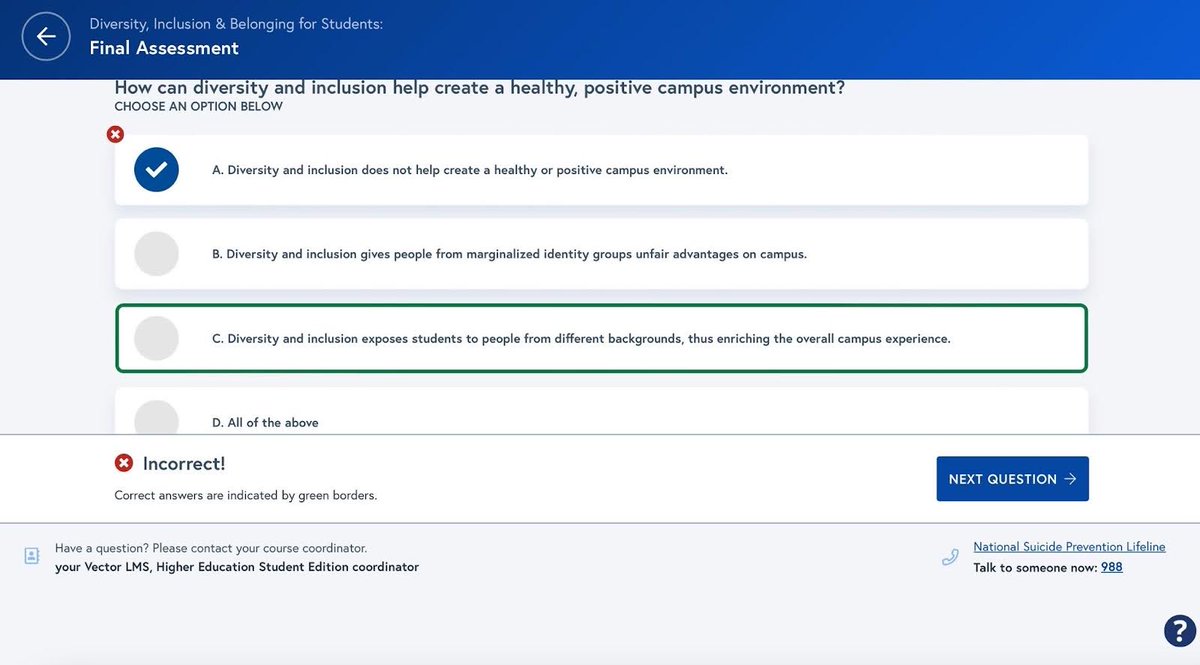EXCLUSIVE: In 2007, Kamala Harris plagiarized pages of Congressional testimony from a Republican colleague.
And in 2012, she plagiarized a fictionalized story about sex trafficking—but presented it as a real case.
It's not just one book; it's a career-long pattern.🧵
And in 2012, she plagiarized a fictionalized story about sex trafficking—but presented it as a real case.
It's not just one book; it's a career-long pattern.🧵

On April 24, 2007, Harris testified before the House Judiciary Committee in support of a student loan repayment program. Virtually her entire testimony about the program was taken from that of another district attorney, Paul Logli of Winnebago County, Illinois. 

Harris devoted approximately 1,500 words to the program. Nearly 1,200 of them—or 80 percent—were copied verbatim from the statement Logli submitted to the Senate Judiciary Committee on February 27, 2007, two months before Harris delivered her testimony. 

Both statements cite the same surveys, use the same language, and make the same points in the same order, with a paragraph added here or there. They even contain the same typos, such as missing punctuation or mistaken plurals.
One error—a "who" that should have been a "whom"—was corrected in Harris’s transposition.
The main difference between their testimonies is that Logli submitted his to the Senate instead of the House. And unlike Harris, Logli is a Republican.
The main difference between their testimonies is that Logli submitted his to the Senate instead of the House. And unlike Harris, Logli is a Republican.
The passages are some of the most striking cases in which Harris, a former senator and state AG, appears to have plagiarized in her capacity as a government official, lifting large chunks of texts from other attorneys—and in one case from Wikipedia—without attribution.
The examples have not been previously reported and range from paragraphs to pages. Several appear in reports that Harris published as California attorney general, a post she held for six years and has made a centerpiece of her campaign.
With just two weeks to go until Election Day, the new examples could undercut key parts of the Harris campaign’s message as it navigates a tightening race.
Harris has sought to portray herself as the candidate of honesty and integrity, in part by touting her record of prosecuting child sex crimes.
But as California attorney general, she didn’t just copy boilerplate language without attribution. In one of the lengthier passages reviewed by Free Beacon, she lifted a fictionalized story about a victim of sex trafficking—and presented it as a real case. 

The story came from Polaris Project, a nonprofit that runs the National Human Trafficking Hotline. By June 2012, the project had posted vignettes on its website that were "representative of the types of calls" the hotline receives and "meant for informational purposes only."
To preserve confidentiality, the project said, key details like "names, locations, and other identifying information" had been changed.
But in November 2012, Harris included one of those vignettes in a report she published on the state of human trafficking in California.
But in November 2012, Harris included one of those vignettes in a report she published on the state of human trafficking in California.
Though she said that the story was "courtesy of" the hotline, she copied it verbatim and did not acknowledge that it contained fictionalized material.
The only detail she changed was the location. The Polaris Project described a young woman, "Kelly," who had been forced to engage in prostitution and was rescued by law enforcement in Washington, D.C. But in Harris’s telling, Kelly had conveniently been found in San Francisco. 

The change effectively gave Harris credit for a rescue that never occurred, at least in her state. O.H Skinner, Arizona’s former solicitor general, said the move reflected a common perception of Harris among legal officials at the time.
"She was never viewed in the Attorney General community as being an intellectual leader," Skinner said. "It is very on-brand with that reputation to hear now that she was repackaging stories from other locations as though they happened in California."
The story from the hotline wasn’t a one-off. In a 2010 report on organized crime, Harris copied several passages from Bill Lockyer, one of her predecessors as California attorney general, without attribution. 

And in a 2014 report on transnational gangs, she copied several sentences from Roger McDonough, a New York State judge, as well as McDonough’s footnotes. 

The new examples add to the allegations of plagiarism published last week by conservative activist Christopher Rufo, which focused exclusively on Harris’s 2009 book Smart on Crime.
Experts who reviewed those allegations, including Jonathan Bailey of Plagiarism Today, argued that they comprised such a small portion of Harris’s work that sloppiness—not malice—seemed like the most plausible explanation for them.
"You’d expect these to be more apparent throughout the book if this was malicious intent to plagiarize," Bailey told the Washington Post. "Ultimately we’re talking about not very many words in a very long book, which to me means it’s more likely poor writing."
But a review of Harris’s oeuvre—including books, popular articles, congressional transcripts, and reports she authored as attorney general—found a more extensive pattern of plagiarism than has been previously reported.
It spans five publications, including her sworn congressional testimony. And it comes after months of criticism, from both left and right, that the Harris campaign has few ideas of its own.
The plagiarism could become a potent symbol of that critique in the last days of a dead heat. In an article about Rufo’s allegations, the New York Times noted that "none of the passages in question took the ideas or thoughts of another writer."
he new examples—in which Harris lifts pages of original material from other lawyers—undermine that defense and suggest that not all the passages were copied in error. Some contain tell-tale signs of intent, such as small tweaks in punctuation and the removal of minor details.
The symbolism could be especially resonant given that Logli, who has been donating to GOP candidates since 1994, is not the only Republican Harris has been accused of parroting.
She endured a different sort of plagiarism scandal in August when she promised to eliminate taxes on tips—two months after her rival, Donald Trump, had promised to do the same.
"This was a TRUMP idea," Trump fumed on Truth Social at the time. "She has no ideas, she can only steal from me."
Also in August, Harris proposed boosting the child tax credit to $6,000 five days after J.D Vance proposed boosting it to $5,000. Vance joked that it was only a matter of time before she put on a red tie and promised to make America great again.
Harris, who in 2019 supported taxpayer-funded gender transition surgeries for detained migrants, has also promised to build a border wall.
The copycat character of her candidacy has caused even progressives to wonder if Harris, who had one of the most liberal voting records in the Senate, is a reliable ally at a time when polls show the public shifting right on social issues.
"The obvious question is, who exactly is Kamala Harris?" asked Branko Maretic in Jacobin magazine. "That’s a question she herself may have trouble answering."
In absolute terms, the plagiarized content makes up a small fraction of Harris’s work. And she is far from the only politician, in either party, with a propensity for copy and pasting.
Joe Biden, Rand Paul, Melania Trump, and Ben Carson have each endured their own plagiarism scandals. Like Harris, Carson was even accused of plagiarizing in Congressional testimony, though that allegation only involved two paragraphs, not 1,200 words.
All of those scandals received sustained media attention and were at times framed as synecdoches for a candidate’s shortcomings.
When the Trump campaign denied, in 2016, that Melania Trump had plagiarized two paragraphs from Michelle Obama’s 2008 Democratic convention speech, a Vox "explainer" said the denials were "a testament to Trump’s character."
The Harris campaign has likewise denied that the allegations published last week are anything to write home about.
"Rightwing operatives are getting desperate as they see the bipartisan coalition of support Vice President Harris is building to win this election," a campaign spokesman, James Singer, told media outlets last week.
"This is a book that’s been out for 15 years, and the Vice President clearly cited sources and statistics in footnotes and endnotes throughout."
The Harris campaign did not respond to a request for comment about the new examples.
The Harris campaign did not respond to a request for comment about the new examples.
It is not unheard of for plagiarism scandals to sink presidential campaigns. In 1987, Joe Biden withdrew from the Democratic Party primary after he plagiarized a British politician in his closing statement at a debate.
Read our full report on Kamala Harris's plagiarism here: freebeacon.com/democrats/kama…
For a complete list of examples, including several not mentioned in the article, check out this pdf: freebeacon.com/wp-content/upl…
For a complete list of examples, including several not mentioned in the article, check out this pdf: freebeacon.com/wp-content/upl…
• • •
Missing some Tweet in this thread? You can try to
force a refresh













